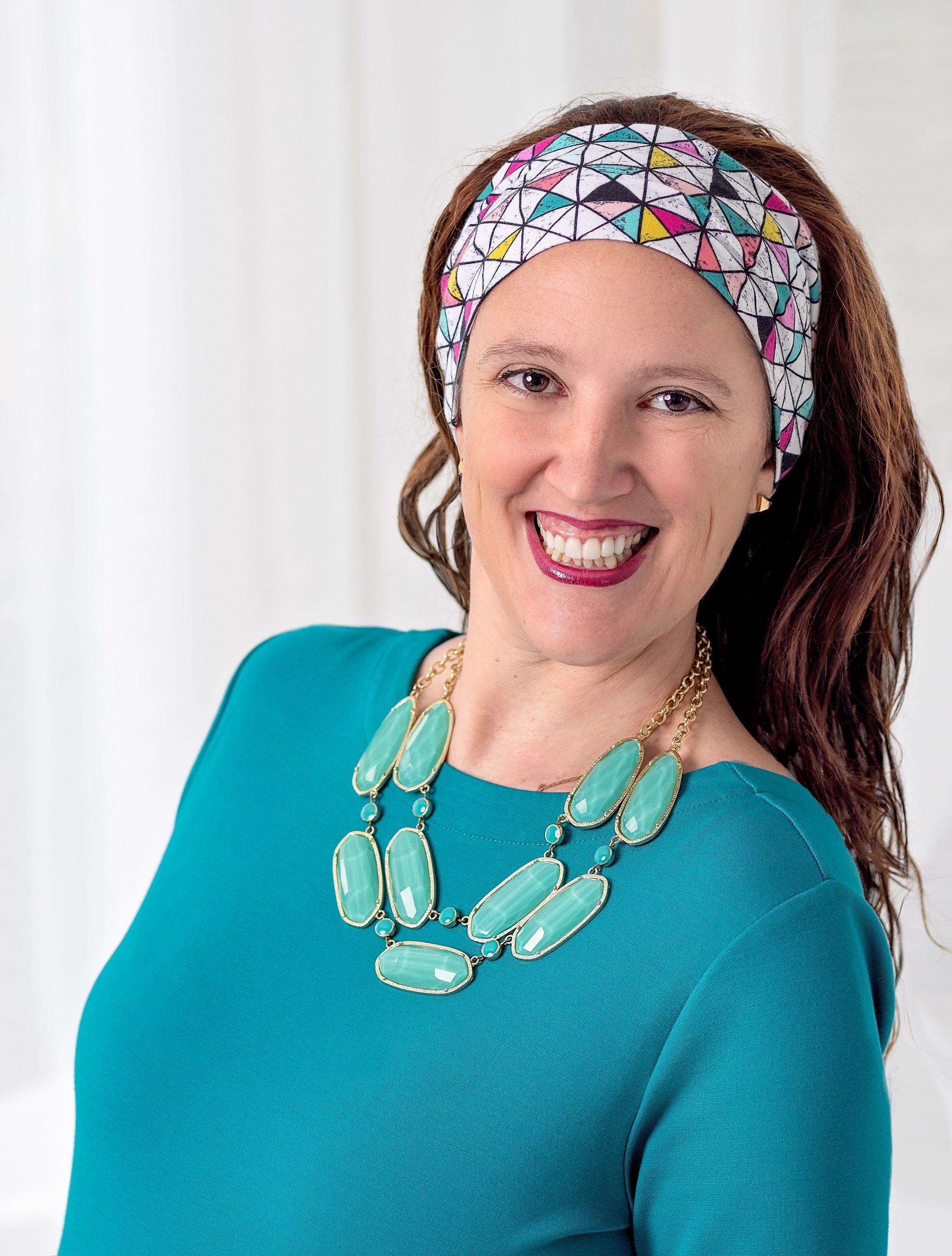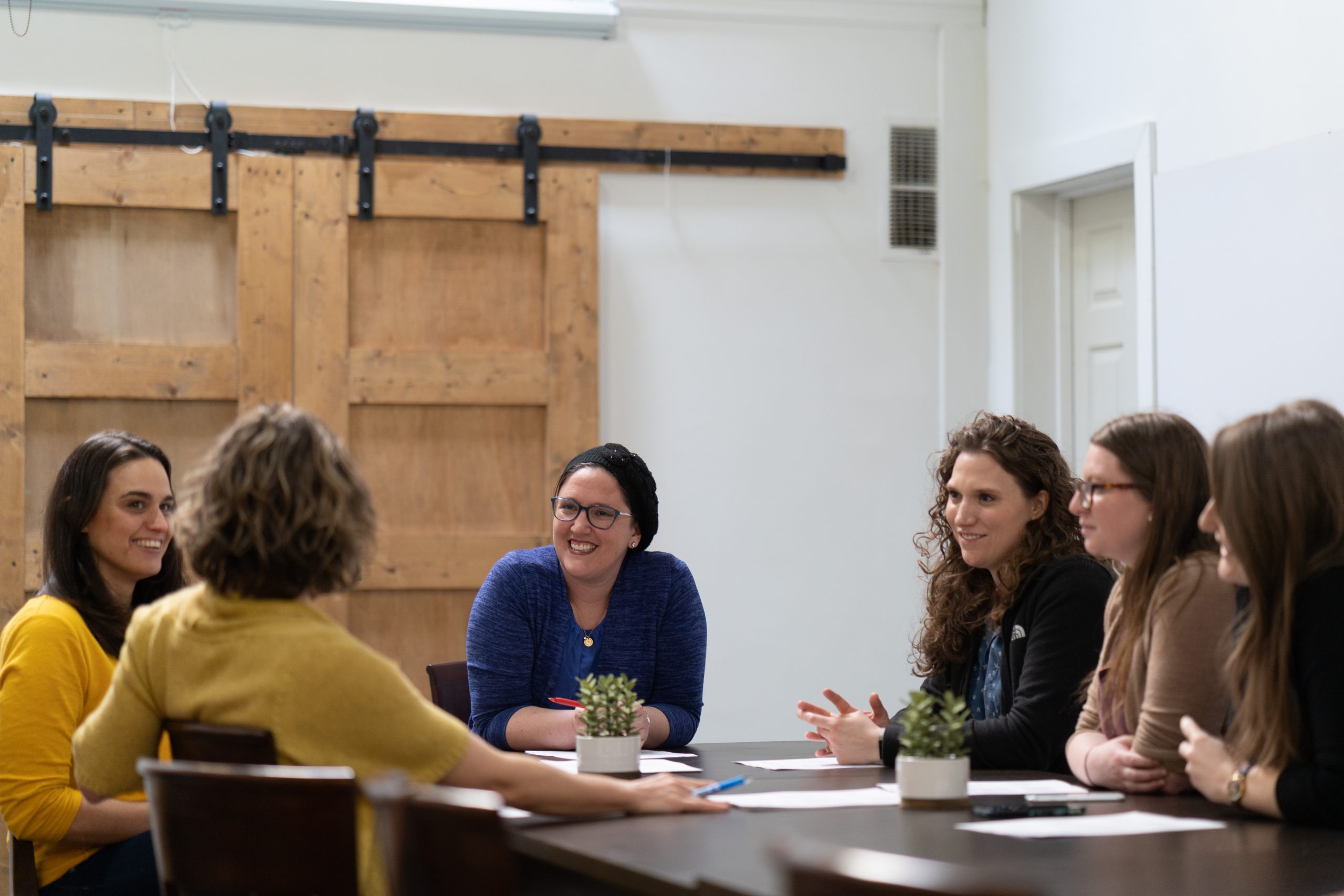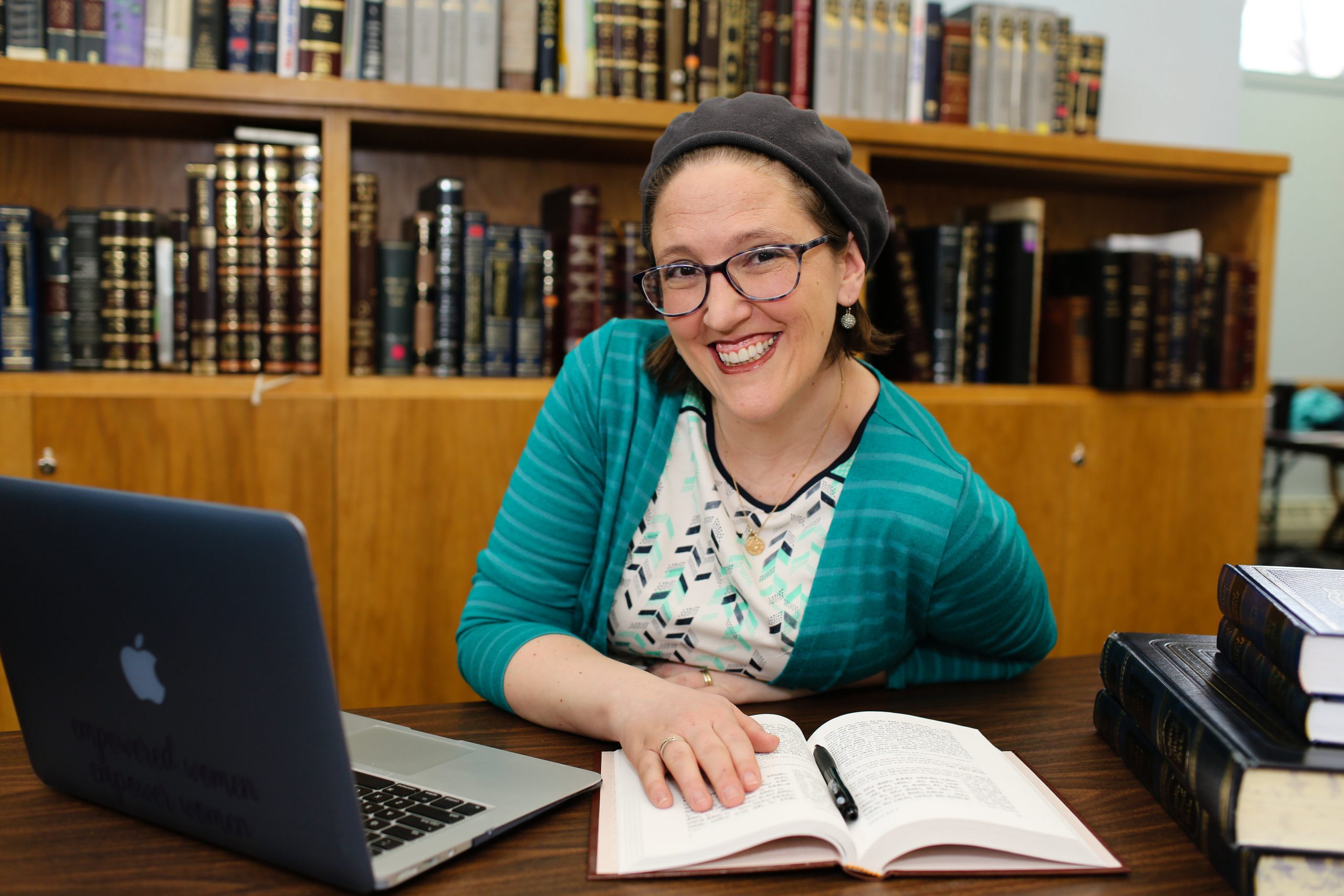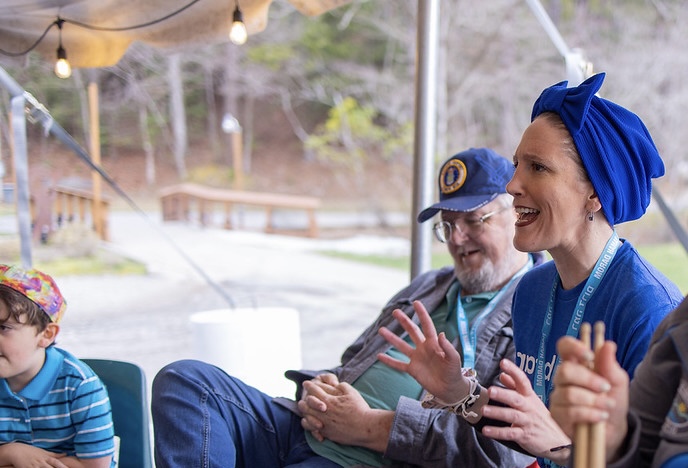Making the World a Better Place
An interview with Rabba Melissa Scholten-Gutierrez
By Penina Taylor
Rabbanit. Rabba. Rabbi. Maharat. No matter what title you use, the idea of an Orthodox woman who is highly educated and “ordained” for Jewish communal service is a controversial one. Either you think that women Rabbis are single handedly responsible for all the ills that befall the Jewish people, or you believe that they are going to bring about the true and final redemption of humankind. For the most part there’s no middle ground. And Rabba Melissa Scholten-Gutierrez is no exception to this phenomenon.
Melissa grew up, what she calls, “West Coast Conservative” and even though she didn’t know anyone who kept kosher or Shabbat growing up, she says that Judaism was always important to her, that she was always striving for her Judaism to have deeper roots. She explains that being Jewish was more than just a cultural identity, it was a religious identity, albeit not a “halachic” one. She went to shul, read the Torah, and led in services.
Unlike many Baalei Teshuva, Melissa’s spiritual journey isn’t one of those with an identifiable “ah-ha” moment. She explains that she had a thirst to learn more about Judaism. The more she learned, the more she took on and the more she took on, the more she wanted to learn. For her it was a natural, slow growth into full observance. But at some point she and her husband Nachum realized that the Conservative movement was no longer the right place for them, that it was no longer their community. She admits that she was very fortunate that she and her husband were on the path together, which is not always the case.
When it comes to her strong connection to Judaism, Melissa credits her grandfather for that, saying that he was her religious guide and a strong influence in her life. That connection resulted in a lifetime of being actively involved in the Jewish community. In high school, Melissa was a member of the Conservative Movement’s youth group, USY, and participated in a program called “Hebrew High” both of which helped her stay connected during those developing years and deepen her spiritual journey. In college she was active in Hillel, an on-campus Jewish student organization. It was those connections that helped her stay involved and engaged with Judaism and ultimately fueled her on her journey towards greater observance.
Melissa attained a double major in Psychology and Social Behavior, and Sociology at UC Irvine. She was inspired to go in this direction when a friend of hers in high school was diagnosed with cancer. When Melissa saw what an important part support played in the lives of those dealing with cancer, it inspired her to head in the direction of what would eventually become a Master’s in Social Work – specifically Medical Social work, working with oncology patients. For graduate school, Melissa went to the University of Illinois at Urbana-Champaign because they had a social work degree with a medical focus. She ended up working at hospice for some time, and despite how difficult that can be, it was very meaningful and fulfilling for her. Even so, she realized that it wasn’t exactly where she wanted to be long term. She then went on to work in prenatal health education. When that contract ended, she found herself unemployed and at a crossroads – where did she want to go from here?
When she sat down and thought about it, she realized that everything she did in her free time was for the Jewish community; perhaps there was a place for her working within the Jewish community as a career? Shortly after she received a call from a temp agency asking her if she would be interested in a job as a receptionist for the Jewish Federation. She thought that perhaps the timing of the call was a sign. When she went for the interview and met with the CEO, he said, “You already have a career as a social worker, why on earth would you want to start over as a receptionist?” She explained that she wanted to work in the Jewish community and that this was as good a place as any to start over with an eye towards that goal. He liked her answer and gave her the job. That course correction was exactly what she needed to get on the right path – Jewish communal work. That was in Colorado.
While working for the Federation in Colorado, she became the person who put “Jewish” into the things that were happening in the “Jewish” Federation. When there was a meeting, she would add in a short dvar Torah, or when there was a holiday coming up, she would make holiday-related program suggestions. She began to notice a pattern, but also began asking herself, “Why is there not more ‘Jewish’ in the Jewish Federation?”
This was about the same time that her husband decided to go to Rabbinical School. In preparation for that, he would be studying in a Mechina (preparatory course) in Israel. The program was two years long, and while he was there, Melissa had an opportunity to pursue further learning as well. As she saw it, she had a couple of options – she could take advantage of a program called FEREP – Federation Executive Recruitment Education Program, which was designed to help Federation workers to pursue higher education, such as a Master’s degree in exchange for a commitment to work in the Federation. Or, she could also take this time to learn Torah, which is something she felt like she hadn’t really done. She knew that she could always go back and earn another Master’s degree, but the opportunity to learn Torah in-depth in Israel might be a once-in-a-lifetime occurrence. So of course, she decided to study Torah.
As she researched programs she realized that there weren’t a lot of options for an English-speaking 30-year-old woman who had never learned Torah on the inside (meaning in-depth, with commentary, etc.) to learn in an all-women’s setting, which is what she really wanted to do. The options were pretty limited, but thankfully that year a women’s seminary called Nishmat was running their Aliza Flatow program. This is a program designed exactly for people like Melissa. Unfortunately, the program has not run every year due to demand and other factors. But fortunately for Melissa, it did happen that year.
So the couple did an ulpan (Hebrew language course) over the summer and then Melissa spent her first year learning at Nishmat, which she says was a phenomenal experience. Within two months she fell in love with text study and learning the sources inside. She felt like this was the thing she had been missing all her life. She describes it as feeling like a light had been lit inside of her.
Shortly before they left for Israel, Melissa had met with Sharon Weiss-Greenberg who had worked in recruitment for Yeshivat Maharat, the first Yeshiva to ordain women to serve as Orthodox Clergy. Maharat stands for Manhiga Hilkhatiti Ruchanit Toranit – which denotes a female “leader of Jewish law, spirituality and Torah.”
Something Sharon saw in Melissa caused her to encourage Melissa to consider going to Maharat. Melissa explained that she had never even learned Torah inside, there was no way she could go to Maharat. But Sharon said, “Just think about it.”
She said she would think about it. Growing up Melissa had encountered many people who told her that she was going to be a Rabbi when she grew up. But she always rejected the idea, because she had her sights set on becoming a doctor (which only changed in high school). She certainly never saw herself becoming a Rabbi.
But after Sharon’s suggestion, when Melissa found herself discovering this love for text study, she thought, “Maybe there’s something there.” And she thought maybe there’s a way to combine that and her desire to put more “Jewish” into the Jewish Federation. So Melissa reached out to Sharon who put her in touch with Rabbi Jeff Fox, the Rosh Yeshiva of Maharat. After that initial conversation, Melissa kept an open mind about the possibilities. Meanwhile, she continued her learning program in Israel.
One day while walking to Nishmat, Melissa heard a podcast by Rabbi Josh Yuter called Yutopia, and in this particular episode, Rabbi Yuter was interviewing three (then) students at Maharat. As she listened to the podcast, she began to cry. She felt as though these women were speaking to the depths of her soul, as they shared their experiences at Maharat – the work
they were doing and the calling that they had and the fact that Maharat had provided a space for them to get the training they needed to do the work they felt called to do in the world. Hearing them helped her to realize that this might just be the missing piece that would allow her to do all of the things she really wanted to do, to be able to do better work in the world. But she knew it couldn’t happen if she didn’t first learn a lot of Torah.
So after finishing her year at Nishmat, Melissa enrolled in Pardes. Pardes is a non-denominational egalitarian yeshiva. Mostly American, although some Europeans also learn there. It has a wide variety of learning programs. She chose Pardes because there was nowhere else for a second year of learning with a high level of Gemara. Not for a 31-year-old English-speaking woman. Melissa is grateful for her experiences at both Nishmat and Pardes, as she feels they gave her a more well-rounded life and learning experience in Israel.
After finishing their two years in Israel, the family moved to NY so that Melissa could go to Maharat and her husband could attend Yeshivat Chovevei Torah. They both attended their respective Yeshivot for four years. After receiving ordination, the Rabbinic family moved to Atlanta where Melissa works at the Jewish Federation of Greater Atlanta and her husband teaches “Toshba” which is short for Torah Sheba’al Pe, or the Oral Torah, to middle school students at the Atlanta Jewish Academy.
While Rabba Melissa’s story is an interesting one, the question on many minds is, “How can a woman be a rabbi?” Meslissa jokes, “Learn a lot of Torah, pass the exams, become a rabbi” but she understands what’s actually behind the question – the idea of giving “smicha” (ordination) to women is a controversial one, especially in Orthodox Judaism. But it’s important to begin the conversation by understanding that today no one actually has smicha. Smicha, which literally means, “the laying on of hands” was originally the passing of the “mantle” from teacher to student, in a direct line from Moses. True smicha is understood to have ceased around 425 CE at the latest. Which effectively means that for the past 1600 years what is called, “smicha,” isn’t really. Today it is accepted as a designation of the “ordained” person’s ability to apply his (her) thorough knowledge of the Talmud to the facts of a given halachic question. And there is no reason why a woman cannot achieve that.
The challenge of this generation of Observant Jews is whether or not we are willing to recognize such leadership and achievement with a title.
– Rabba Melissa Scholton-Gutierrez
The arguments against women having smicha, which are essentially against women being in public leadership, may have made sense thousands of years ago, but today many women are in public leadership anyway, within the Jewish community. And, Melissa adds, it cannot be that there’s an inherent problem with women attaining high levels of Torah learning, because no one takes issue with Rebbetzins Heller or Smiles or Rabbanit Henkin, three of the most learned Jews in the world (female or otherwise). It would seem that Orthodox Judaism doesn’t have a problem with highly learned women, it has a problem with them taking a title such as Rabbi, Rabba or Maharat, which could lead one to believe that it’s a matter of male ego, at least at some level, although Melissa is hesitant to say so.
She points out that the primary arguments against women’s Orthodox ordination center on women in public leadership, acting as judges, “kol isha”, and being counted in a minyan, and yet none of those issues are actually directly tied to the idea of giving a woman the title of “Rabbi”.
But in truth, a person can be a rabbi and never even broach these issues. Melissa explains that for herself for example, nothing in her rabbinic role involves “kol isha”. Nothing in her rabbinic role involves being counted in a minyan. And nothing in her rabbinic role involves being a judge. She says the work she does makes her a public leader regardless of whether or not she had the title “Rabbi”. And yet, Melissa, goes back to the fact that there are many very well educated men and women in very right-wing streams of Judaism that hold certain female Torah teachers in extremely high regard, and whose Torah they would listen to and learn from, so clearly, that’s not the problem.
Even women as judges shouldn’t be an issue, given that Devorah is a prime example, from the Tanach, of a woman judge. And regarding kol isha or being counted in a minyan? Well, if you think about it, a male Rabbi doesn’t have to lead the davening (prayer service) even in his own congregation (and often does not), so why would a female rabbi – even a female rabbi of a congregation – have to do that? And the only time the Rabbi HAS to count in a minyan is if there are only 9 or 10 men present for the service – something that does happen in very small remote locations, but certainly not in most congregations. The Rabbi does need to make sure there IS a minyan but technically he/she doesn’t have to be counted as part of it. There are so many things that a Rabbi does for his community – but being part of the minyan and leading the prayer service are a small part, if any, of the job he does – and that’s IF he’s a shul rabbi. The majority of people who have earned the title, “Rabbi” are not shul rabbis. And neither are most Maharats.
Regarding the idea of a woman in public leadership, although in recent times it has become unacceptable, the truth is that there have always been some Jewish women who have been leaders in their communities. The challenge of this generation of Observant Jews is whether or not we are willing to recognize such leadership and achievement with a title. But even more important, Melissa says, is the pay. With the acknowledgement of the education and work and a title comes pay. She emphasizes that it’s really important that when a community hires a “rabbinic couple” to do work, that we are not really hiring a man and expecting his wife to work for free, because that’s what often happens. So when we are giving women learning and accreditation we are giving them an opportunity to be paid for the work that they are doing. Which is so important.
Melissa points out that the world looks a lot different now than it did thousands or even hundreds of years ago and today’s rabbinic leadership needs to think critically – not discarding what previous rabbis said and did, but looking at it, thinking about it, thinking about where we are now and thinking about people’s lives now. Human life and its challenges today are different than they were in the past. Halacha is designed to take both physical and mental wellness into account, and those are different today, as is our understanding of these dimensions.
Melissa says that in order to understand how to apply halacha today, we need to look at the gap between when our sefarim were written and where we are today. It’s a big task to bridge that gap, but the more people we have that are willing to deeply engage in the conversation about that, the better it is – it makes us better and it makes our world better. Melissa feels that her job as a rabba is to make the world a better place.
What special projects is Rabba Melissa currently working on? She is on the leadership team of a project called A Mitzvah to Eat. It’s a project that is focused on raising awareness that not all Jewish people are able to fast. In addition to raising awareness they provide people with additional resources when fasting is not feasible.
She’s also on the executive committee for the Jewish Women’s Fund of Atlanta, is the Clergy Advisory Chair for MACoM: Metro Atlanta Community Mikvah and she is on the Rabbis for Repro Advisory Group – National Council for Jewish Women.
I asked Rabba Melissa what she would say to a woman who is interested in pursuing a Maharat smicha and is worried that it might not be appropriate for someone who is Orthodox. She says, “You need to think about your own community and how it will be received within your community. Not all communities will react the same way. That being said, there are a number of people who have pursued smicha who have come from the entire range of the Jewish community, whose families are truly from across the entire spectrum of the community.” And she invites anyone considering it to reach out to her, or directly to Maharat. Even though Maharat holds a very special place in her heart, it’s important to know that although Maharat was the first, it is not the only place to pursue advanced learning for women anymore. So, there may be other options that may be a better fit for you because of your particular community. “But, don’t let your community stop you from pursuing more learning, because women’s learning is so important and your voice is so important, and if you are thinking about it, then you know that your voice is important and you have something special to offer to the Jewish world – and that’s great and it’s something we need. You just need to think about where the right place is to make that happen.”





